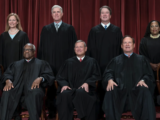By Glynn Wilson –
A three-judge panel of federal judges all appointed to the court before there was an open Internet or a Web Press has struck down a complicated set of rules set forth by the Federal Communications Commission to preserve competition on the Web in what critics call a major blow to what’s known as “Net Neutrality.” But all is not lost.
The U.S. District Court of Appeals for the District of Columbia remanded the FCC’s “Open Internet Order” back to the agency to try again to stop the big telecommunications and media corporations from turning the World Wide Web into a commercial zone where big money players control the field.
In its order, Senior Judge Laurence Silberman, appointed to the court by President Ronald Reagan in 1985, said the FCC lacked the authority to implement and enforce its rules under the legal framework the agency put forth under former Chairman Julius Genachowski.
Critics say the flawed rules and the court ruling could undermine the freedoms that led to innovation, competition and the grass roots democratic nature of the Web — if the FCC under President Barack Obama is not able to come up with a new plan before it’s too late.
“We’re disappointed that the court came to this conclusion. Its ruling means that Internet users will be pitted against the biggest phone and cable companies — and in the absence of any oversight, these companies can now block and discriminate against their customers’ communications at will,” FreePress.Net President and CEO Craig Aaron said in a statement following the decision.
“The compromised Open Internet Order struck down today left much to be desired, but it was a step toward maintaining Internet users’ freedom to go where they wanted, when they wanted, and communicate freely online,” Aaron said. “Now, just as Verizon promised it would in court, the biggest broadband providers will race to turn the open and vibrant Web into something that looks like cable TV. They’ll establish fast lanes for the few giant companies that can afford to pay exorbitant tolls and reserve the slow lanes for everyone else.”
He said the FCC under the leadership of former Chairman Genachowski made a grave mistake when it failed to ground its open Internet rules on solid legal footing.
“Internet users will pay dearly for the previous chairman’s lack of political will,” Aaron said. “That’s why we need to fix the problems the agency could have avoided in the first place.”
He said new FCC Chairman Tom Wheeler recently stated that the FCC must have the ability to protect broadband users and preserve the Internet’s fundamental open architecture.
“In order to do that, he must act quickly to restore and reassert the FCC’s clear authority over our nation’s communications infrastructure,” Aaron said. “The agency must follow its statutory mandate to make broadband communications networks open, accessible, reliable and affordable for everyone.”
As a small, innovate media company trying to go up against the big corporate media organizations for the past decade, the New American Journal is concerned about the future of the Web going forward because of this ruling. But we remain hopeful that since we still have some smart folks in Washington working on this under a Democratic president, there might still be hope to preserve the Web as we know it. If the people were to elect one more pro-big business, anti-regulation Republican president, we might as well kiss the open Internet — and our Web Press freedoms – goodbye.
A big danger here that no news organization covering this has mentioned is the potential ability on the part of the big telecoms and media giants to discriminate against smaller news organizations whose politics they disagree with. Think of it as the Information Superhighway’s version of New Jersey Governor Chris Christie slowing traffic on a bridge as retribution against a political opponent.
More Coverage
POLITICO interview with FCC commissioner Jessica Rosenworcel













